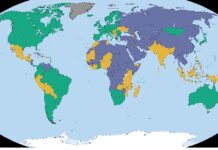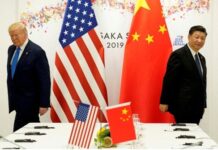India’s stock markets fell to their lowest level in eight months, dropping 0.9% by noon on February 24. The decline was led by financial and IT stocks as investors worried about slowing U.S. economic growth.
Prashanth Tapse, Senior VP (Research) at Mehta Equities, said weak trends in Asian markets and a sharp fall in U.S. stocks on February 21 contributed to the downturn. He also pointed to Trump’s tariff threats and ongoing foreign investor withdrawals as key reasons. “There are concerns that the U.S. may be heading toward stagflation, which could hurt global growth,” he added.
For the Nifty index to show strength, it must close above 23,000. A stronger recovery is possible if it crosses 24,067, which is its 200-day moving average, Tapse noted.
Markets have been under pressure throughout February, with losses in 15 out of 17 trading days. Foreign investors have sold Indian stocks worth Rs 36,977 crore this month, but domestic investors have bought Rs 42,601 crore, helping to balance some of the losses.
The recent market sell-off was triggered by weak U.S. economic data, which showed a slowdown in business activity. Investors are also uncertain about Trump’s trade policies.
Midcap and Smallcap stocks fell nearly 1% each. Among 13 major sectors, 11 traded lower, with Nifty IT and Nifty Bank facing the most pressure. Nifty IT dropped 2.3%, mainly due to heavy selling in Infosys and TCS. Since Indian IT firms earn a large portion of their revenue from the U.S., fears of a slowdown there have hurt the sector.
However, some sectors managed to stay positive—Nifty Pharma rose 0.2%, and Nifty FMCG gained 0.1%.
Top losers in the Nifty 50 included Trent, TCS, Infosys, HCLTech, and Wipro, which fell 2-3%. On the other hand, Tata Consumer, M&M, Eicher Motors, Nestlé, and Dr. Reddy’s saw modest gains of 0.5-1%.
Shares of NTPC Green Energy fell 7% as investors sold their holdings after the end of a three-month lock-in period.
Meanwhile, InterGlobe Aviation (IndiGo) continued its winning streak for the sixth straight session, reaching Rs 4,543 per share. Citi analysts raised their target price for the stock to Rs 5,200 from Rs 5,100 and maintained a “buy” rating.
Healthcare Global Enterprises gained 3% after private equity firm KKR announced plans to invest $400 million in the company.
Analysts at Angel One warned that with a shortened monthly expiry week and global uncertainties, markets could see more volatility ahead.
Last week, the Sensex and Nifty faced selling pressure, especially in auto and financial stocks. Concerns over U.S. inflation, Trump’s trade policies, and the Federal Reserve’s cautious approach to rate cuts have kept investors on edge. Additionally, foreign investors are shifting funds toward Chinese stocks, adding to the pressure on Indian markets.


























































